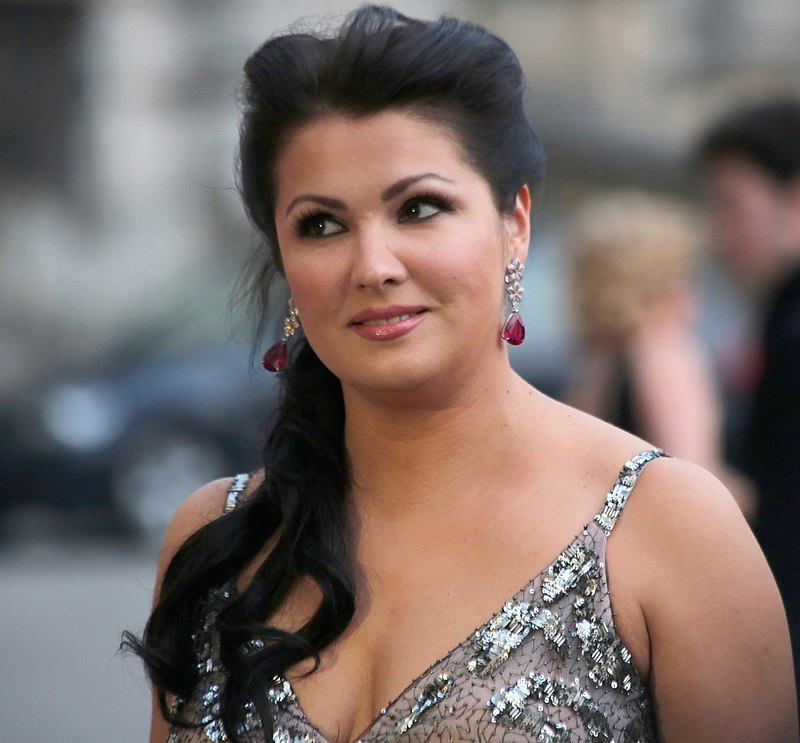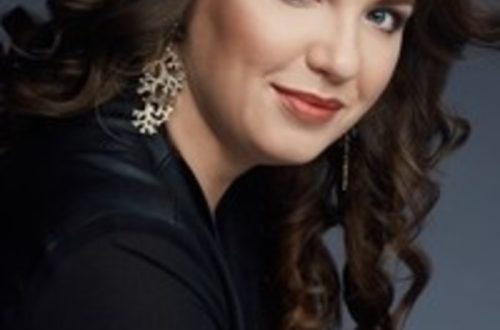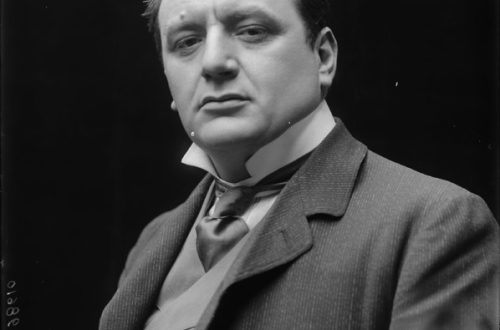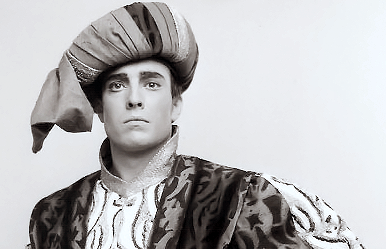
Anna Netrebko |
Anna Netrebko
Anna Netrebko is a new generation star
How Cinderellas Become Opera Princesses
Anna Netrebko: I can say that I have character. Basically, it’s good. I am a kind and not envious person, I will never be the first to offend anyone, on the contrary, I try to be friends with everyone. Theatrical intrigues have never really touched me, because I try not to notice the bad, to draw the good out of any situation. I very often have a wonderful mood, I can be content with little. My ancestors are gypsies. There is so much energy sometimes that I don’t know what to do with it. From the interview
In the West, in every opera house, from the big New York Metropolitan and London’s Covent Garden to some small theater in the German provinces, a lot of our compatriots sing. Their fates are different. Not everyone manages to break into the elite. Not many are destined to stay at the top for a long time. Recently, one of the most popular and recognizable (no less than, for example, Russian gymnasts or tennis players) has become the Russian singer, soloist of the Mariinsky Theater Anna Netrebko. After her triumphs in all the major theaters of Europe and America and the happy baptism of fire by Mozart at the Salzburg Festival, which has the reputation of a king among equals, the Western media hastened to proclaim the birth of a new generation of opera diva – a star in jeans. The erotic appeal of the newfound operatic sex symbol only added fuel to the fire. The press immediately seized on one interesting moment in her biography, when in her conservatory years she worked as a cleaner at the Mariinsky Theater – the story of Cinderella, who became a princess, still touches the “wild West” in any version. In different voices, they write a lot about the fact that the singer “dramatically changes the laws of the opera, forcing fat ladies in Viking armor to forget,” and they predict the fate of the great Callas to her, which, in our opinion, is at least risky, and there are no more different women on light than Maria Callas and Anna Netrebko.
The opera world is a whole universe that has always lived according to its own special laws and will always differ from everyday life. From the outside, the opera may seem to someone an eternal holiday and the embodiment of a beautiful life, and to someone – a dusty and incomprehensible convention (“why sing when it’s easier to speak?”). Time passes, but the dispute has not been resolved: opera fans still serve their capricious muse, opponents do not get tired of debunking her falsehood. But there is a third side in this dispute – the realists. These argue that the opera has become smaller, turned into a business, that a modern singer has a voice in sixth place and everything is decided by appearance, money, connections, and it would be nice to have at least a little intelligence for this.
Be that as it may, our heroine is not only a “beauty, athlete, Komsomol member”, as the hero of Vladimir Etush puts it in the comedy “Prisoner of the Caucasus”, but in addition to all her excellent external data and blooming youth, she is still a wonderful, warm and open person, the very naturalness and immediacy. Behind her are not only her beauty and the omnipotence of Valery Gergiev, but also her own talent and work. Anna Netrebko – and this is still the main thing – a person with a vocation, a wonderful singer, whose silver lyric-coloratura soprano in 2002 was awarded an exclusive contract by the famous Deutsche Gramophone company. The debut album has already been released, and Anna Netrebko has literally become a “showcase girl”. For some time now, sound recording has played a decisive role in the career of opera artists – it not only immortalizes the singer’s voice in the form of CDs at different stages of life, but chronologically sums up all his achievements on the theater stage, makes them available to all mankind in the most remote places where there is no opera theatres. Contracts with recording giants automatically promote the soloist to the rank of an international mega-star, make him a “cover face” and a talk show character. Let’s be honest, without the record business there would be no those Jesse Norman, Angela Georgiou and Roberto Alagna, Dmitry Hvorostovsky, Cecilia Bartoli, Andrea Bocelli and many other singers, whose names we know well today largely thanks to the promotion and huge capitals that were invested in them by record companies. Of course, Anna Netrebko, a girl from Krasnodar, was terribly lucky. Fate generously endowed her with gifts of fairies. But in order to become a princess, Cinderella had to work hard …
Now she flaunts on the covers of such fashionable and not directly related to music magazines as Vogue, Elle, Vanity Fair, W Magazine, Harpers & Queen, Inquire, now the German Opernwelt declares her the singer of the year, and in 1971 in the most ordinary Krasnodar family (mother Larisa was an engineer, father Yura was a geologist) just a girl Anya was born. School years, by her own admission, were terribly gray and boring. She tasted her first successes, doing gymnastics and singing in a children’s ensemble, however, in the south everyone has voices and everyone sings. And if in order to become a top model (by the way, Anna’s sister, who lives married in Denmark), she did not have enough height, then she clearly could count on the career of a successful gymnast – the title of candidate master of sports in acrobatics and The ranks in athletics speak for themselves. Back in Krasnodar, Anya managed to win a regional beauty contest and become Miss Kuban. And in her fantasies, she dreamed of being a surgeon or … an artist. But her love for singing, or rather, for operetta, overcame her, and immediately after school at the age of 16 she went north, to distant St. Petersburg, entered a music school and dreamed of feathers and caramboline. But an accidental visit to the Mariinsky (then Kirov) Theater confused all the cards – she fell in love with opera. Next is the famous St. Petersburg Rimsky-Korsakov Conservatory, famous for its vocal school (the names of several graduates are enough to make everything clear: Obraztsova, Bogacheva, Atlantov, Nesterenko, Borodin), but from the fourth year … there is no time left for classes. “I didn’t finish the conservatory and didn’t get a diploma, because I was too busy on the professional stage,” Anna admits in one of her Western interviews. However, the absence of a diploma worried only her mother, in those years Anya did not even have a free minute to think: endless competitions, concerts, performances, rehearsals, learning new music, working as an extra and a cleaner at the Mariinsky Theater. And thank God that life does not always ask for a diploma.
Everything was suddenly turned upside down by the victory at the Glinka Competition, held in 1993 in Smolensk, the composer’s homeland, when Irina Arkhipova, generalissimo of Russian vocals, accepted the laureate Anna Netrebko into her army. At the same time, Moscow first heard Anya at a concert at the Bolshoi Theater – the debutante was so worried that she barely mastered the coloratura of the Queen of the Night, but honor and praise to Arkhipova, who managed to discern the remarkable vocal potential behind the appearance of the model. A few months later, Netrebko begins to justify the advances and, first of all, makes her debut with Gergiev at the Mariinsky Theater – her Susanna in Mozart’s Le nozze di Figaro becomes the opening of the season. All Petersburg ran to watch the azure nymph, who had just crossed the Theater Square from the conservatory to the theater, she was so good. Even in the scandalous pamphlet book by Cyril Veselago “The Phantom of the Opera N-ska” she was honored to appear among the main characters as the main beauty of the theater. Although strict skeptics and zealots grumbled: “Yes, she’s good, but what does her appearance have to do with it, it wouldn’t hurt to learn how to sing.” Having entered the theater at the very peak of the Mariinsky euphoria, when Gergiev was just beginning the world expansion of the “best Russian opera house”, Netrebko (to her credit) crowned with such early laurels and enthusiasm does not stop there for a minute, but continues to gnaw at the difficult granite of vocal science. “We need to continue to study,” she says, “and prepare in a special way for each part, master the manner of singing of the French, Italian, German schools. All this is expensive, but I rebuilt my brain a long time ago – nothing is given for free. Having gone through the school of courage in the most difficult parties in her native Kirov Opera (as they still write in the West), her skill has grown and strengthened along with her.
Anna Netrebko: Success came from the fact that I sing at the Mariinsky. But it’s easiest to sing in America, they like almost everything. And it is incredibly difficult in Italy. On the contrary, they don’t like it. When Bergonzi sang, they shouted that they wanted Caruso, now they shout to all the tenors: “We need Bergonzi!” In Italy, I don’t really want to sing. From the interview
The path to the heights of the world opera was for our heroine, although swift, but still consistent and went in stages. At first, she was recognized thanks to the tour of the Mariinsky Theater in the West and recordings from the so-called “blue” (according to the color of the building of the Mariinsky Theater) series of the Philips company, which recorded all Russian productions of the theater. It was the Russian repertoire, starting with Lyudmila in Glinka’s opera and Marfa in Rimsky-Korsakov’s The Tsar’s Bride, that was included in Netrebko’s first independent contracts with the San Francisco Opera (albeit under Gergiev’s direction). It is this theater that since 1995 has become the second home of the singer for many years. In the everyday sense, it was difficult in America at first – she didn’t know the language well, she was afraid of everything alien, she didn’t like food, but then she didn’t get used to it, but rather rebuilt. Friends have appeared, and now Anna quite likes even American food, even McDonald’s, where hungry night companies go to order hamburgers in the morning. Professionally, America gave Netrebko everything she could only dream of – she got the opportunity to smoothly move from Russian parts, which she herself does not like very much, to Mozart’s operas and the Italian repertoire. In San Francisco, she first sang Adina in Donizetti’s “Love Potion”, in Washington – Gilda in Verdi’s “Rigoletto” with Placido Domingo (he is the artistic director of the theater). Only after that she began to be invited to Italian parties in Europe. The highest bar of any operatic career is considered to be a performance at the Metropolitan Opera – she made her debut there in 2002 by Natasha Rostova in Prokofiev’s “War and Peace” (Dmitry Hvorostovsky was her Andrey), but even after that she had to sing auditions to prove to the theaters her the right to French, Italian, German music. “I had to go through a lot before I was equated with European singers,” Anna confirms, “for a long time and persistently only the Russian repertoire was offered. If I were from Europe, this certainly would not have happened. This is not only wariness, it is jealousy, fear of letting us into the vocal market.” Nevertheless, Anna Netrebko entered the new millennium as a freely convertible star and became an integral part of the international opera market. Today we have a more mature singer than yesterday. She is more serious about the profession and more careful – to the voice, which in response opens up more and more new opportunities. Character makes destiny.
Anna Netrebko: Mozart’s music is like my right foot, on which I will stand firmly throughout my career. From the interview
In Salzburg, it is not customary for Russians to sing Mozart – it is believed that they do not know how. Before Netrebko, only Lyubov Kazarnovskaya and the lesser-known Victoria Lukyanets managed to flicker there in Mozart’s operas. But Netrebko flashed so that the whole world noticed – Salzburg became her finest hour and a kind of pass to paradise. At the festival in 2002, she shone as a Mozartian prima donna, performing her namesake Donna Anna in Don Giovanni in the homeland of the solar genius of music under the baton of the chief authenticist conductor of our days, Nikolaus Harnoncourt. A big surprise, since anything could be expected from the singer of her role, Zerlina, for example, but not the mournful and majestic Donna Anna, who is usually sung by impressive dramatic sopranos – however, in the ultra-modern production, not without elements of extremism, the heroine was decided quite differently , appearing very young and fragile, and along the way, demonstrating elite underwear from the company sponsoring the performance. “Before the premiere, I tried not to think where I was,” Netrebko recalls, “otherwise it would be very scary.” Harnoncourt, who changed his anger to mercy, conducted in Salzburg after a long break. Anya told how he unsuccessfully searched for Donna Anna for five years, one that would fit his new plan: “I came to him for an audition sick and sang two phrases. That was enough. Everyone laughed at me, and no one except Arnoncourt believed that I could sing Donna Anna.
To date, the singer (perhaps the only Russian) can boast of a solid collection of Mozart’s heroines on the world’s main stages: in addition to Donna Anna, the Queen of the Night and Pamina in The Magic Flute, Susanna, Servilia in The Mercy of Titus, Elijah in ” Idomeneo” and Zerlina in “Don Giovanni”. In the Italian region, she conquered such Belkant peaks as the sad Bellini’s Juliet and the insane Lucia in Donizetti’s opera, as well as Rosina in The Barber of Seville and Amina in Bellini’s La sonnambula. The playful Nanette in Verdi’s Falstaff and the eccentric Musette in Puccini’s La Boheme look like a kind of self-portrait of the singer. Of the French operas in her repertoire, so far she has Mikaela in Carmen, Antonia in The Tales of Hoffmann and Teresa in Berlioz’s Benvenuto Cellini, but you can imagine how wonderful she can become Manon in Massenet or Louise in Charpentier’s opera of the same name. Favorite composers to listen to are Wagner, Britten and Prokofiev, but she would not refuse to sing Schoenberg or Berg, for example, his Lulu. So far, the only role of Netrebko that has been argued about and disagreed with is Violetta in Verdi’s La Traviata – some believe that just the exact sounding of notes is not enough to fill the space of the charismatic image of the Lady with camellias with life. Perhaps it will be possible to catch up in the film-opera, which intends to shoot Deutsche Gramophone with her participation. Everything has its time.
As for the debut album of selected arias on the Deutsche Gramophone, it exceeds all expectations, even among ill-wishers. And there will be more of them, including among colleagues, the higher the singer’s career rises, the better she sings. Of course, massive promotion instills a certain prejudice in the heart of the music lover and he picks up the advertised compact with a certain doubt (they say that good does not need to be imposed), but with the first sounds of a fresh and warm voice, all doubts recede away. Of course, far from Sutherland, who reigned in this repertoire before, but when Netrebko lacks technical perfectionism in the most difficult coloratura parts of Bellini or Donizetti, femininity and charm come to the rescue, which Sutherland did not have. To each his own.
Anna Netrebko: The further I live, the less I want to bind myself with some kind of ties. This may pass. By the age of forty. We’ll see there. I see a boyfriend once a month – we meet somewhere on tour. And it’s okay. Nobody bothers anyone. I would like to have children, but not now. I am now so interested in living on my own that the child will simply get in the way. And interrupt my entire kaleidoscope. From the interview
The private life of an artist is always a subject of increased interest on the part of the viewer. Some stars hide their personal lives, some, on the contrary, advertise it in detail to raise their popularity ratings. Anna Netrebko never made secrets from her private life – she just lived, therefore, probably, there were never any scandals or gossip around her name. She is not married, she loves freedom, but she has a heart friend – younger than her, also an opera singer, Simone Albergini, a Mozart-Rossinian bassist well-known in the opera scene, a typical Italian by origin and appearance. Anya met him in Washington, where they sang together in Le nozze di Figaro and Rigoletto. She believes that she is very lucky with a friend – he is absolutely not jealous of success in the profession, he is only jealous of other men. When they appear together, everyone gasps: what a beautiful couple!
Anna Netrebko: I have two convolutions in my head. The one that is bigger is “store”. Do you think that I am such a romantic, sublime nature? Nothing like this. The romance is long gone. Until the age of seventeen, I read a lot, it was a period of accumulation. And now there is no time. I just read some magazines. From the interview
She is a great epicurean and hedonist, our heroine. He loves life and knows how to live happily. She loves shopping, and when there is no money, she just sits at home so as not to be upset when she passes by shop windows. Her little quirk is clothes and accessories, all sorts of cool sandals and handbags. In general, a stylish little thing. Strange, but at the same time he hates jewelry, puts them on only on stage and only in the form of costume jewelry. He also struggles with long flights, golf, and business talk. He also loves to eat, one of the latest gastronomic hobbies is sushi. From alcohol he prefers red wine and champagne (Veuve Clicquot). If the regime allows, she looks into discos and nightclubs: in one such American institution where celebrity toilet items are collected, her bra was left, which she cheerfully told everyone in the world, and most recently won a cancan mini-tournament in one of St. entertainment clubs. Today I dreamed of going with friends to the Brazilian Carnival in New York, but the recording of the second disc with Claudio Abbado in Italy prevented. To unwind, she turns on MTV, among her favorites are Justin Timberlake, Robbie Williams and Christina Aguilera. Favorite actors are Brad Pitt and Vivien Leigh, and favorite movie is Bram Stoker’s Dracula. What do you think, opera stars are not people?
Andrey Khripin, 2006 ([email protected])





